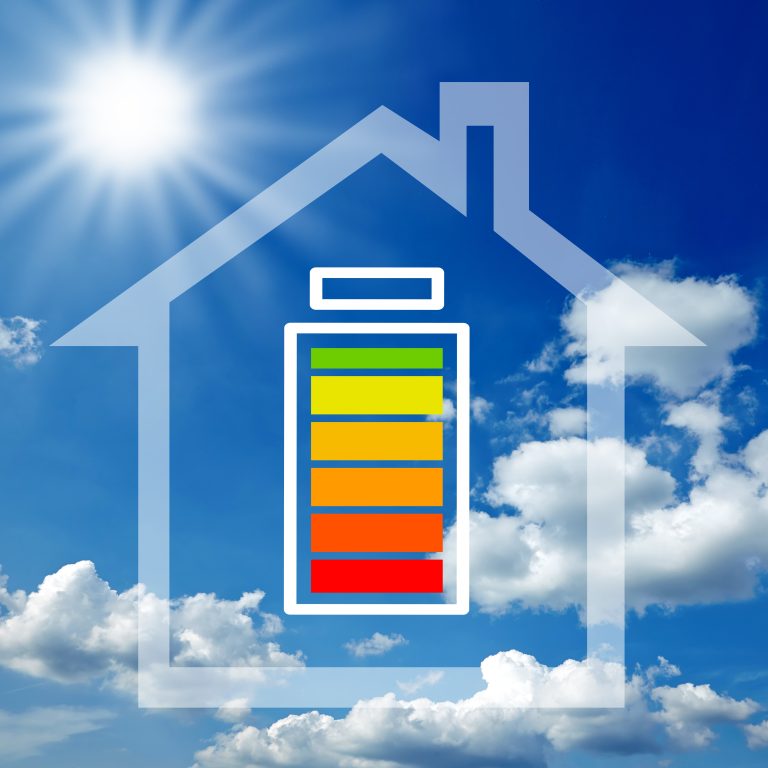Running systems off of solar power without battery storage is a lot like plugging in an appliance; if the sun is up, the “plug is in,” and you get power. However, that power cuts off when the sun goes down. If you want to enjoy some of the energy you create through solar after sundown (or to use a lot of power at once), you will need a solar energy storage solution.
When it comes to solar energy and energy storage in New Mexico, Poulin Solar Pro has the answers you need to make the right choice for solar on your property.
What are the Benefits of Storing Solar Energy?
When it comes to off-grid solar systems, battery storage is crucial for ensuring a consistent and reliable power supply. While solar power is a great source of energy, its usefulness can be limited if you can’t store the energy you generate during the day to use later on. This is where battery storage comes in.
In places like New Mexico where solar power can generate a lot of energy, it’s not always at the most useful times for your daily routine. But by storing that energy in batteries, you can use it whenever you need it, including after dark or during power blackouts due to weather. This allows you to fully take advantage of the energy generated by your solar panels, regardless of the time of day.
Battery storage for off-grid solar systems also allows you to plan ahead for when you want to use the solar power. By storing up energy, you can use a large amount of it all at once, which can be particularly useful for powering high-energy devices or appliances. Additionally, by strategically applying stored solar energy, you can offset your grid-based power bills and save money in the long run.
Overall, battery storage is an essential component of any on- or off-grid solar system. It allows you to fully maximize the benefits of solar power, providing a reliable and consistent energy source that can be used whenever you need it. Whether you’re looking to use solar energy after dark, power high-energy devices, or save money on your power bills, battery storage is the key to unlocking the full potential of solar power.
How is Solar Energy Stored?
Solar energy can be stored in many different ways, but the most common four methods are electrochemical (batteries), gravitational, pressure, and thermal. Keep reading to learn more.
Electrochemical Batteries
The vast majority of solar energy storage systems are electrochemical – stored in either lead-acid or lithium-ion batteries that charge up the chemicals inside and then release that charge when the battery is hooked up.
Potential/Kinetic Energy Storage
Gravitational or kinetic energy storage is accomplished by using excess solar electricity to pump water up a hill. When you need the energy later, you get hydroelectric power by running the water back down the hill—for example, Niagara Falls.
Air Pressure Storage
Air pressure storage runs a different pump for extra solar energy, which compresses air. The compressed air is then released to create energy later on.
Thermal Energy Storage
Thermal energy uses your extra solar power to generate heat or cold in an insulated space that can be used later.
Why is Storing Solar Energy Important?
Storing energy from solar panels is vital to your ability to fully control the electricity you generate. Unless you have a perfectly balanced supply-demand system during the day, you likely generate more electricity than you need. Why waste the full capacity of your solar panels when you can enjoy that electricity later?
On a small scale, storing solar energy allows you to use your solar power for things like lights, appliances, or heat at night or store up a large quantity to ride out a power outage. On a larger scale, storing solar energy allows power grids to use renewable sources of energy with more control and efficiency.
What is Battery Storage?
Battery storage makes use of electrochemical energy. In this case, the extra power that is generated by your solar panels is used to cause a chemical reaction within the battery that effectively stores the electricity. When the battery is discharged, the chemical reaction is reversed, which releases electrons to flow out of the battery and provide power.
What Types of Batteries are Used for Solar Storage?
Solar energy can be stored in most energy storage batteries, but most solar storage systems feature Lithium Ion batteries. This is because lithium is a lightweight metal that stores electricity for a longer period and is generally more efficient than other types of batteries like lead-acid or nickel-cadmium.
Many people choose battery banks to store a large amount of electricity to stock up for emergencies. Be sure to check out our blog on solar batteries to learn more about battery storage.
How Long Can Solar Energy Be Stored?
You can store solar power for years with high-quality and well-maintained lithium batteries. This is great news for New Mexico property owners looking to use solar power to plan ahead. Storing energy from solar panels works well if a pre-established battery array is ready to absorb the electricity that isn’t used immediately.
Choose Solar in New Mexico – Contact Poulin Solar Pro
Selecting your solar partner in New Mexico is an important choice. You always want to seek to own your solar equipment instead of PPE or leasing, to get the best value from your solar panels.
Poulin Solar Pro is proud to provide reliable self-owned solar arrays and battery solutions to property owners all over New Mexico.
Contact us today to explore your property’s options and potential to generate both short-term and long-term solar energy.
Featured Image: stockwerk-fotodesign / Shutterstock

